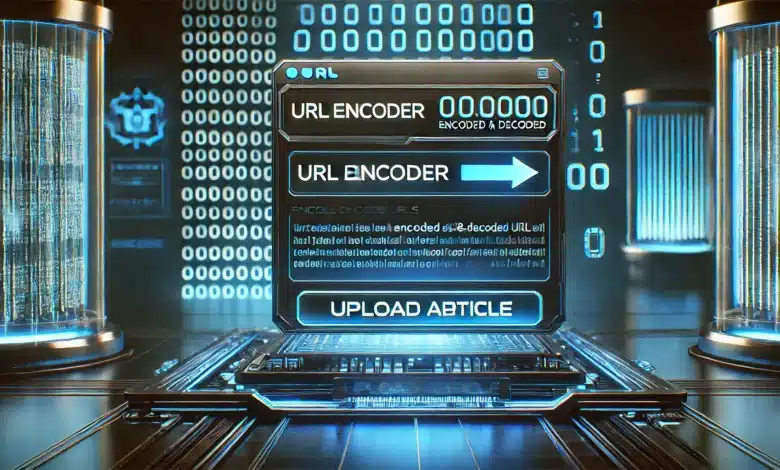
Managing URLs is one of the key tasks for any website, especially when you’re trying to maintain an organized and user-friendly platform. If you are using or planning to use UploadArticle, you may find it necessary to know how to manage your URLs properly. In this guide, we will explain how URL encoders and decoders work and why they are important for platforms like UploadArticle. Whether you’re creating articles, uploading media, or simply working on content management, this tool is a game-changer.
So, let’s dive into what a URL encoder and decoder are and how you can use them to enhance your website’s functionality.
What is a URL Encoder and Decoder?
A URL encoder is a tool that converts characters into a format that can be safely transmitted over the internet. You might wonder why this is necessary. Well, when URLs contain special characters, such as spaces, question marks, or symbols, they can cause issues in a browser or search engine. The URL encoder makes sure these characters are transformed into a safe format, so they can be used without problems.
On the flip side, a URL decoder reverses the process. If you encounter a URL with encoded characters, the decoder will transform them back into their original form.
For example:
- URL Encoding: This is a test becomes This%20is%20a%20test.
- URL Decoding: This%20is%20a%20test becomes This is a test.
When you work with UploadArticle, managing URLs properly ensures that your content is easily accessible and properly indexed by search engines.
Why Use URL Encoder and Decoder with UploadArticle?
When using platforms like UploadArticle, you’ll often have to deal with various URLs, such as article links, media file links, and even links to images or other assets. URLs are an essential part of SEO, and any errors in URL formatting can cause your articles to be misread by search engines.
The URL encoder and decoder uploadarticle process helps by making sure that all your URLs are clean, simple, and well-structured. This is important not only for usability but also for improving your site’s ranking in search engines.
How Does the URL Encoder and Decoder Help SEO?
Search Engine Optimization (SEO) is all about improving your website’s visibility. Search engines like Google use URLs to understand and rank your content. Well-structured URLs are easy for these engines to crawl and index.
The url encoder and decoder uploadarticle tool ensures that your URLs do not contain any problematic characters. If your article URL looks like this:
www.uploadarticle.com/hello world?article=123,
the spaces and special characters could cause issues for search engines. A URL encoder would turn this into:
www.uploadarticle.com/hello%20world%3Farticle%3D123.
With encoded URLs, search engines will have no trouble indexing your content, and it will be more likely to show up in relevant search results.
How to Use the URL Encoder and Decoder UploadArticle
If you are new to using an encoder and decoder with UploadArticle, here’s how you can do it step by step:
Step 1: Prepare Your URL
Before using the encoder or decoder, make sure your URL is ready. For instance, if you’re working with an article titled “My New Article on UploadArticle”, you’ll need to format this into a clean URL, like:
www.uploadarticle.com/my-new-article-on-uploadarticle
Step 2: Encode the URL
If your URL includes special characters, such as spaces or punctuation marks, you’ll want to encode it. For example, “My New Article” becomes My%20New%20Article when encoded. You can do this through various online tools that offer free URL encoding services.
Step 3: Decode the URL
Sometimes, you may need to decode a URL that has already been encoded. This can happen when you receive links from other platforms or websites. Use the URL decoder to turn the encoded string back into a readable format.
Step 4: Apply the Encoded URL to UploadArticle
Once your URL is encoded, you can paste it into your UploadArticle platform or website where needed. This ensures your content links remain clean and error-free.
How URL Encoding Improves Website Performance
Efficient URL management can also enhance website performance in other ways. For example, clean and properly formatted URLs tend to load faster and cause fewer errors, leading to a better user experience. Also, UploadArticle users will appreciate the seamless experience when they click on clean, clickable links.
When your URLs are well-structured and easy to read, they can be indexed faster by search engines. This helps improve your site’s visibility, as search engines favor websites with easily navigable content.
URL Encoding for Better Website Security
Aside from making URLs more user-friendly and SEO-friendly, URL encoding is also an important part of website security. Special characters in URLs can sometimes be used for harmful purposes, such as injecting malicious code into your website.
By using an encoder and decoder, you can ensure that any special characters are transformed into a safe format, reducing the risk of security vulnerabilities. This is especially important when users or visitors input their own data on your website.
The Role of URL Decoding in Content Management
When managing content on UploadArticle, you may encounter URLs that need to be decoded. For example, when you receive a link from a contributor or other sources, it may have been encoded. Decoding it will allow you to see the actual content or article title.
Proper URL decoding can also help when you want to clean up old or incorrect URLs. If you have URLs that contain symbols or incorrect formatting, decoding and re-encoding them correctly will ensure everything is in order.
Best Practices for URL Management in UploadArticle
Here are some best practices you can follow when using url encoder and decoder uploadarticle tools:
- Keep URLs Short and Simple: Short URLs are easier to share, remember, and rank better in search engines.
- Avoid Special Characters: Stick to letters, numbers, and hyphens. If you need to include a space or special character, use encoding.
- Be Consistent: Use a consistent format for all your URLs. This will make it easier to manage them as you add more content.
- Use Descriptive Words: Instead of generic terms like “page1” or “article2”, use descriptive words that help people and search engines understand the content.
- Monitor Your URLs Regularly: Check for broken or incorrect URLs, and fix them using the URL decoder tool.
Challenges You Might Face with URL Management
Although managing URLs with UploadArticle can be easy, there are some common challenges you might face:
- Broken Links: Over time, some URLs may stop working. These can lead to 404 errors, which are not good for SEO. Regularly check and update broken links.
- Long URLs: Sometimes, URLs become too long and hard to share. Make sure you use a URL shortener or encoder to keep them manageable.
- Special Characters: Special characters can sometimes cause problems, especially with encoding and decoding. Always check your URLs to ensure they’re correctly formatted.
Conclusion:
Managing URLs efficiently is crucial for any website, including those using UploadArticle. A URL encoder and decoder uploadarticle tool can help you create clean, safe, and SEO-friendly URLs that improve your site’s performance and user experience. By understanding how encoding and decoding work, you can ensure your content is easily accessible, search-engine friendly, and secure.
While URL management is mostly straightforward, it’s important to be aware of the challenges that might arise—such as broken links, long URLs, and issues with special characters. Regularly checking and updating your URLs, using URL shorteners when needed, and ensuring proper formatting will keep everything running smoothly.
In the end, mastering URL encoding and decoding is a simple yet powerful way to enhance your site’s overall functionality. By following best practices and utilizing the right tools, you can ensure your UploadArticle platform remains organized, efficient, and ready for both users and search engines alike. Keep these tips in mind, and you’ll be on your way to managing your URLs like a pro.






